Understanding Why Chickens Eat Their Eggs: Causes and Solutions
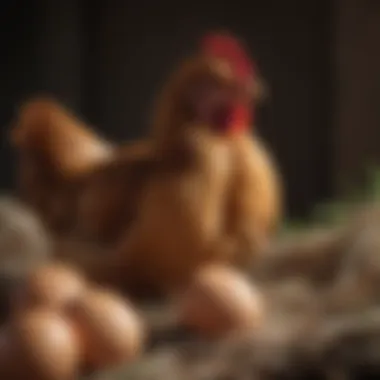
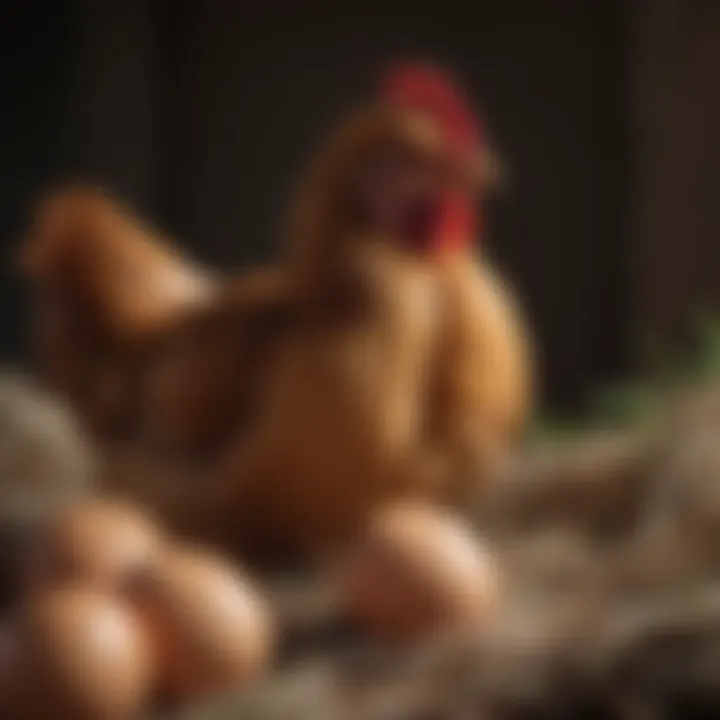
Intro
Chickens are fascinating creatures, but their behavior can sometimes puzzle keepers. One behavior that tends to raise concern is when chickens eat their own eggs. Understanding why this occurs is crucial for anyone involved in poultry keeping. This behavior can stem from several factors, ranging from instinctual drives to environmental influences.
This article aims to dissect the reasons behind this peculiar eating habit. We will explore various aspects, including nutritional deficiencies, environmental stressors, and behavioral patterns. We will also delve into practical strategies that poultry keepers can employ to reduce or eliminate egg-eating in their flocks.
Understanding Egg Eating Behavior
Egg eating can be concerning for chicken keepers, as it not only diminishes the food supply but may also indicate underlying issues within the flock. Chickens might not initially realize that eating their eggs is detrimental. Therefore, it is vital to approach this problem with a structured strategy to ensure flock well-being.
In the sections that follow, we will cover the multitude of factors contributing to egg-eating behavior. We will also discuss sound practices and insights provided by experienced poultry keepers to help manage this challenge effectively.
Prelims to Chicken Behavior
Understanding chicken behavior is essential for poultry keepers, avian enthusiasts, and animal lovers alike. Chickens exhibit a complex range of behaviors that can influence their health, productivity, and social interactions. Recognizing these behaviors allows caregivers to create a better environment for their flocks.
The Complexity of Avian Behavior
Chickens are not just simple creatures following instinctual behaviors. They possess a sophisticated set of reactions influenced by various factors such as environment, health, and social structures. The dynamics within a flock can alter how individual chickens behave, including their tendencies to engage in egg consumption. Each chicken's personality, which can range from assertive to docile, also plays a significant role in how they interact with their surroundings.
Researchers have documented many behaviors in chickens, from their foraging habits to their social configurations. The complex structure of a chicken's social hierarchy, often referred to as the pecking order, affects not only their relationship with other birds but also their access to resources. Behavioral changes can sometimes signal underlying problems, like stress or health issues, which are crucial for flock management.
Egg Consumption as a Behavioral Trait
Egg consumption, or egg eating, is a behavioral phenomenon that can raise concerns among poultry keepers. Understanding this behavior requires a closer look at the various factors that lead to it. Chickens may consume their eggs due to boredom, nutritional deficiencies, or environmental stressors.
When a chicken starts to eat its eggs, it may become a habit that is difficult to break. It is important to distinguish between occasional egg consumption and a consistent pattern. Frequent egg eating can negatively impact poultry productivity and economics for chicken owners. Recognizing this behavior early gives poultry keepers a chance to intervene before it becomes entrenched.
To effectively address egg consumption, one must identify the root causes behind it. A thorough assessment of the chicken's diet, housing conditions, and social interactions will often reveal critical insights. By analyzing these elements, one can implement changes that enhance the well-being of the flock and mitigate egg-eating behavior.
Natural Instincts and Survival Mechanisms
The behavior of chickens, including their tendency to eat their own eggs, cannot be fully understood without considering their natural instincts. These instincts are crucial for survival and can influence a wide range of actions, including feeding habits. Every chicken exhibits certain instinctual behaviors that are inherited from their wild ancestors. These behaviors reflect their need to adapt to availability of resources and environmental conditions.
The Role of Survival Instincts
Chickens have retained many behaviors from their wild ancestors that have evolved to secure survival. When some chickens consume their eggs, this may be tied to an instinctual response to conditions they perceive as threatening. For example, if a hen feels that she needs to conserve nutrients due to scarcity, she may turn to her own eggs as a food source. This reaction can sometimes occur in scenarios where hens experience stressors in their environment, leading them to prioritize immediate nutritional needs over potential future offspring.
"Survival instincts dictate many of the behaviors observed in chickens, tying their actions closely to their environment."
Furthermore, chickens utilize communal laying practices. They hens often lay eggs together, sometimes causing confusion about ownership. Chickens may consume others’ eggs as a way of maintaining community hygiene or reducing competition for nest space. This behavior is reflective of their evolution and social structures.
Nutritional Sources in the Natural Habitat
In the wild, chickens forage for food to meet their dietary needs. They eat a diverse range of items, including insects, seeds, and vegetation. However, domesticated chickens might not have access to the same variety of nutrients. If their diet lacks essential elements like protein and calcium, they might instinctively seek alternatives.
Here are some of the main nutritional deficiencies that can lead to egg-eating behavior:
- Low calcium levels can cause soft-shelled eggs, prompting hens to consume their eggs in search of that nutrient.
- Insufficient protein can lead hens to view their eggs as a protein source available nearby.
- Lack of vitamins and minerals in their feed can trigger the instinct to search for other food sources, which can include their own eggs.
In summary, understanding these natural instincts and survival mechanisms provides insight into why chickens might eat their own eggs. Recognizing these aspects can help poultry keepers develop appropriate feeding strategies to minimize such behavior.
Nutritional Deficiencies

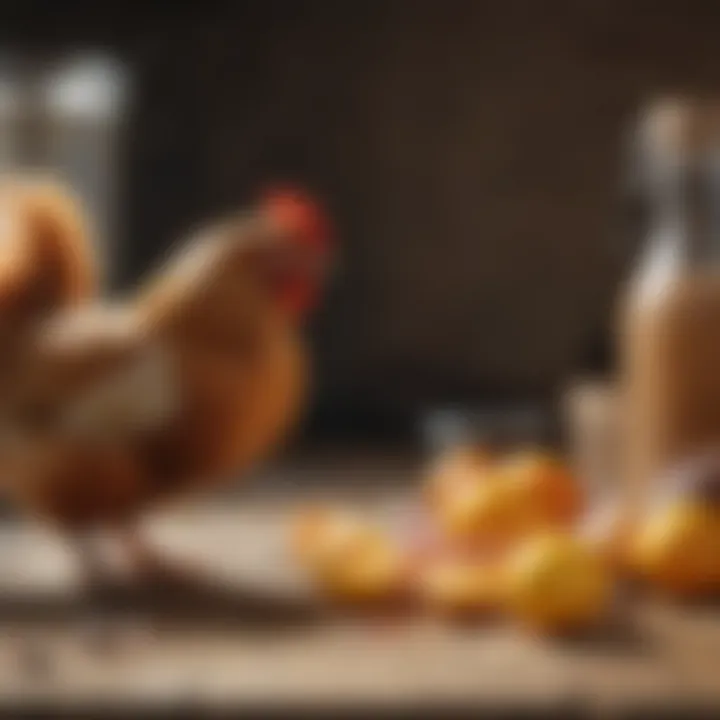
Nutritional deficiencies play a crucial role in the behavior of chickens, especially regarding egg consumption. When chickens do not receive the essential nutrients they need, it can lead to various health issues, which may, in turn, trigger the instinct to eat their own eggs. Focus on nutrition for poultry is paramount not only for the overall health but also for the productive capacity of the flock. Many factors related to nutrition can influence a chicken's behavior, leading them to engage in egg-eating, which ultimately impacts egg production and flock well-being.
Understanding Essential Nutrients
Essential nutrients for chickens include proteins, vitamins, and minerals. Each of these components serves a unique purpose in a chicken’s life cycle. A balanced diet rich in these nutrients fosters good health and reduces the likelihood of unhealthy behaviors.
- Proteins: Vital for growth, repair, and muscle development. Insufficient proteins may lead to inadequate eggshell strength, prompting chickens to peck at and consume their own eggs.
- Vitamins: Particularly vitamins A, D, and E are important for reproductive health. A deficiency in these vitamins can weaken the quality and number of eggs produced, leading some chickens to engage in egg-eating behavior.
- Minerals: Calcium, phosphorus, and sodium are essential for bone health and overall metabolism. An inadequate supply can result in poor egg production. Chickens might consume eggs as a way to compensate for these deficiencies.
Listening to the dietary needs of the flock is essential for maintaining chicken health. Poultry keepers should monitor the nutritional content of feed and supplement as necessary to provide chickens with a balanced diet.
Impact of Poor Diet on Egg Production
A poor diet has a direct negative impact on egg production, which can lead chickens to eat their own eggs. Here are some observable outcomes of inadequate nutrition:
- Reduced Egg Shell Quality: A key sign of poor nutrition is thin or weak eggshells. When eggs break easily, chickens might turn to consuming broken eggs to fulfill their nutritional needs.
- Decreased Egg Production: Chickens require certain nutrients to maintain consistent egg-laying patterns. A lack of necessary vitamins and minerals can lead to irregular laying cycles. As production decreases, some chickens may develop a habit of eating eggs to mitigate nutritional shortfalls.
- Overall Health Decline: Nutritional deficiencies can induce stress, leading to behavioral issues including egg-eating. Unhealthy chickens often demonstrate compromised immune functions and other health concerns increasing their likelihood to engage in undesirable behaviors.
"A balanced diet is the foundation of animal welfare and productivity."
Stress and Environmental Factors
Stress in chickens can manifest in various ways, one of which is egg-eating behavior. Understanding the environmental aspects that contribute to this behavior is crucial for poultry owners looking to enhance the overall well-being of their flock. Stressors, whether they are physical, social, or environmental, can lead to changes in behavior including the unwanted act of consuming eggs. A comprehensive grasp of these factors can help prevent such behavior, ensuring healthier and more productive chickens.
Identifying Stressors in the Coop
The coop environment is vital to the health of chickens. A poor setup may induce undue stress, challenging a chicken's ability to thrive. There are numerous stressors that can affect chicken behavior.
- Inadequate Space: Chickens need enough room to move and interact. A confined area can heighten competition and anxiety.
- Poor Ventilation: A lack of air circulation can lead to heat stress and discomfort.
- Unfamiliar Noises: Sudden or loud sounds can alarm chickens, making them feel unsafe.
- Presence of Predators: Even if they are unseen, the scent or sounds of potential predators can cause stress.
Addressing these stressors can significantly improve the environment. For poultry keepers, monitoring coop conditions regularly helps maintain a peaceful atmosphere. Consider strategies such as enhancing ventilation, ensuring adequate space, and minimizing loud disturbances.
Impact of Overcrowding on Behavior
Overcrowding poses a significant challenge for hens. When chickens are crammed together, they face increased competition for resources such as food, water, and nesting space. This stress can result in a variety of behaviors, including egg-eating.
- Social Hierarchy Disruption: Chickens establish a pecking order. Overcrowding can cause conflicts, leading to stress and aggression within the group.
- Limited Access to Lay Eggs: Hens may not find suitable nesting spots if there are too many birds, causing frustration and encouraging them to eat eggs instead.
- Increased Anxiety Levels: Constant close proximity can cause anxiety in chickens, leading to erratic behaviors including egg consumption.
For those raising chickens, it is essential to maintain appropriate flock sizes. Ideally, each bird should have at least four square feet of space inside the coop. Regular checks on egg availability, as well as behavioral monitoring, can provide critical insights into the overall flock health.
Full attention to environmental factors can tremendously impact chicken behavior and well-being.
Overall, by recognizing and addressing stressors in the coop and the implications of overcrowding, poultry owners can work towards reducing stress-induced egg-eating behaviors in chickens.
Cultural and Social Factors
Cultural and social factors play a significant role in understanding why chickens eat their own eggs. Chickens, like many social animals, exhibit behaviors that are influenced by their interactions with other members of the flock and their environment. This section explores how these factors contribute to egg-eating behavior while addressing key elements that poultry keepers should consider.
Hierarchy and Pecking Order
Chickens establish a social structure, defined by a pecking order. This hierarchy determines access to resources, including food, nesting sites, and rest areas. Chickens lower on this hierarchy may display stress or anxiety, leading them to engage in atypical behaviors such as egg eating. When dominance disputes arise, some hens may peck at eggs to assert themselves, particularly if they feel threatened.
The pecking order is not static; it can shift as chickens mature or if new birds are introduced. This constant change can lead to instability within the flock.
- Key Points:


- The social structure can influence individual behaviors.
- Stress from hierarchical dynamics can lead to egg consumption.
- Chickens often mimic each other's actions, reinforcing certain behaviors.
Behavioral Mimicry in Flocks
Chickens are highly observant creatures and often mimic behaviors within their flock. If one hen begins to eat her own egg, others may follow suit, mistaking this act as normal behavior. This kind of behavioral mimicry can rapidly spread through the flock and create a cycle of egg eating that may be difficult to eliminate.
To reduce the risk of this behavior becoming established, it is important for poultry keepers to monitor their flocks carefully. Recognizing early signs and addressing them can prevent larger issues down the line.
- Benefits of Monitoring:
- Early detection of egg-eating behaviors can prevent propagation.
- Maintaining peace within the flock supports overall well-being.
- Fostering a healthy environment can deter mimicry of negative behaviors.
Important Note: Understanding the cultural and social dynamics of chickens helps poultry owners manage their flocks more effectively. Being mindful of these interactions is crucial for promoting health and productivity.
Medical Issues and Digestive Health
Understanding the relationship between medical issues and digestive health is crucial, especially when addressing why chickens might consume their own eggs. Chickens, like all animals, can experience a variety of health problems impacting their behavior. This section will analyze how health-related concerns could lead to this unusual phenomenon. We will look into signs of health problems, how these can affect their eating habits, and the role that digestive health plays in overall behavior among chickens.
Identifying Health Problems
Identifying health problems in chickens is often the first step in managing their wellbeing. Some signs to observe include:
- Decreased egg production: A sudden drop could indicate an underlying issue.
- Change in behavior: This could be anything from lethargy to unusual aggression.
- Loss of appetite: If chickens are not eating properly, it might lead them to consume their eggs as a substitute for nutrition.
- Physical symptoms: Look for signs like feather loss, abnormal droppings, or lethargy, which may indicate that something is wrong.
Regular health checks are advisable. Keeping a close watch on any irregularities can facilitate timely intervention.
Digestive Disorders and Egg Eating
Digestive disorders can significantly affect a chicken’s behavior, leading potentially to egg-eating. Issues may arise from a diet lacking in essential nutrients, upsetting the digestive system. Chickens may eat their eggs if they fail to obtain adequate nutrition or if they experience digestive discomfort. Some common disorders that could lead to this behavior include:
- Sour crop: This is a condition where food ferments in the digestive tract, leading to discomfort.
- Coccidiosis: A parasitic infection that can cause diarrhea and weight loss, impacting overall health.
- Intestinal blockage: This can lead to pain and abnormal behaviors, including egg-eating.
If a chicken appears to have a disorder, it is essential to consult a veterinarian. Ignoring these signs could lead to further complications, impacting the entire flock's health and productivity.
Effective management of a chicken’s digestive health necessitates a balanced diet and proactive health monitoring. Neglecting these aspects can escalate into serious issues, affecting egg production and overall wellbeing.
Monitoring diet is fundamental. Providing a mixture of grains, greens, and supplements can promote a healthier digestive system, potentially curbing egg-eating behaviors.
Overall, understanding medical issues and digestive health in chickens can lead to improved management strategies. Addressing these health aspects may help mitigate the problem of egg consumption, contributing to a healthier and more productive flock.
Egg-Laying Patterns and Habits
Understanding the egg-laying patterns and habits of chickens is fundamental for poultry keepers aiming to maintain a productive and healthy flock. These patterns are influenced by various aspects, including breed, age, and environmental conditions. Knowledge of these elements can help in diagnosing issues, like egg consumption behaviors, thus contributing to better chicken management practices.
Understanding Laying Cycles
Chickens typically have a consistent egg-laying cycle. This cycle generally lasts about 24 to 26 hours, resulting in one egg being laid nearly every day. However, multiple factors can affect this cycle.
- Breed Specificity: Different chicken breeds have varying laying capabilities. For instance, the White Leghorn is well-known for its prolific laying ability, typically producing around 300 eggs a year. In contrast, heritage breeds like Orpingtons may lay less frequently but can still be productive.
- Age Considerations: Young pullets begin laying eggs at around 5 to 6 months of age. As they mature, their laying rate may stabilize. However, as chickens age, their laying frequency often declines.
- Light Exposure: Day length has a significant impact on laying cycles. Chickens require approximately 14-16 hours of light each day to maintain optimal laying rates. In winter months, this can decrease unless artificial lighting is implemented.
Understanding these key factors helps poultry keepers anticipate egg production levels, allowing for appropriate adjustments in feeding and housing.
Timing and Frequency of Egg Consumption
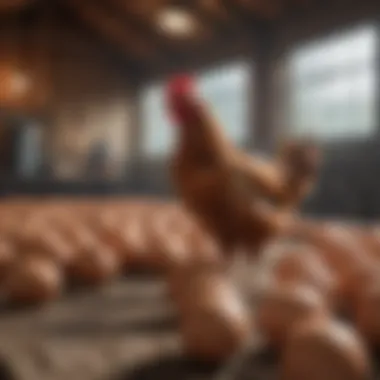
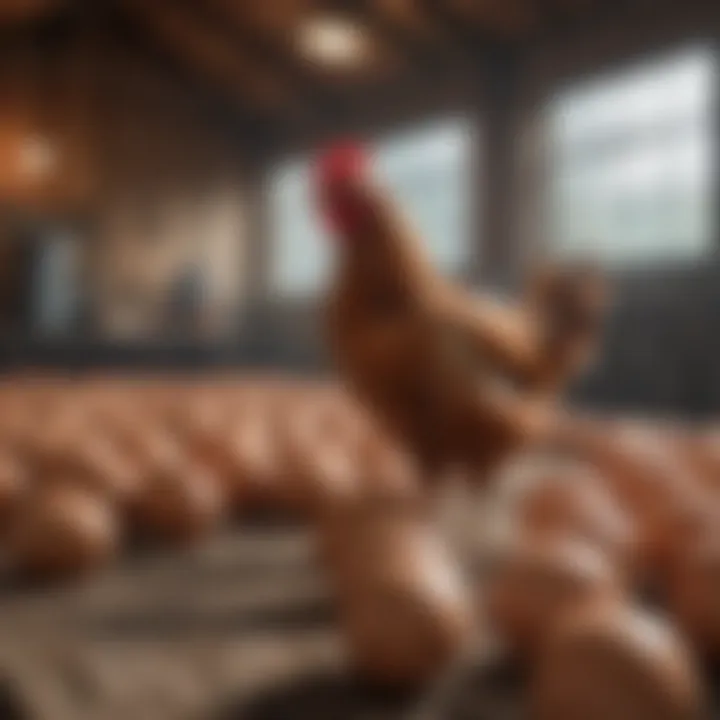
Timing is crucial when chickens consume eggs, which can happen during or after laying. Recognizing the patterns of egg consumption can provide insight into the flock's behavior.
Egg consumption tends to increase under specific circumstances:
- Post-Laying Period: Chickens may consume eggs soon after they are laid. The fresh egg may attract attention, especially if there is a pecking behavior among flock members.
- Environmental Changes: Stressors, such as a change in coop conditions, may lead to increased egg consumption. Chickens might eat eggs as a response to disruptions in their normal routine.
- Frequency of Egg Supply: If chickens are experiencing fluctuating feed availability or a lack of other protein sources, they may turn to their eggs. This behavior is often instinctual, reflecting their need for a balanced diet.
By being aware of these timing and consumption habits, keepers can implement strategies to discourage egg eating. Monitoring the flock and ensuring a stable environment minimizes the risk of egg-related behaviors, thus fostering better habits overall.
Key Takeaway: Understanding egg-laying patterns is essential for effective poultry management, directly influencing the health and productivity of chickens.
Preventive Measures and Solutions
Addressing the issue of chickens eating their own eggs is critical for livestock health and productivity. Implementing preventive measures and solutions can help mitigate this problem effectively. These strategies can lead to healthier flocks, improved egg production, and a more harmonious coop environment. Understanding these methods will give poultry keepers the tools they need to protect their chickens and their livelihoods.
Optimizing Nutrition for Chickens
Proper nutrition is fundamental in maintaining a healthy chicken population. A balanced diet rich in essential nutrients can deter behaviors such as egg eating. Chickens require specific vitamins and minerals that support their overall health.
- Protein: This macronutrient is vital for growth and egg production. Include sources like soybean meal or fish meal.
- Calcium: Essential for strong eggshells. Offer oyster shell or limestone.
- Vitamins: Vitamin D plays a role in calcium absorption. Ensure they have access to sunlight or provide supplements.
By regularly assessing and enhancing their diet, poultry owners can prevent deficiencies that might lead to abnormal behaviors.
Creating a Stress-Free Environment
Chickens thrive in a calm and safe setting. Reducing stressors in their environment can significantly decrease the likelihood of egg eating. Identify and mitigate any potential stress factors:
- Space: Ensure adequate space for each chicken to roam. Overcrowded conditions can lead to aggression and unhealthy competition.
- Social Structure: Maintain a balanced pecking order. Introducing new birds should be done gradually to avoid disruptions.
- Hiding Spots: Create areas for chickens to hide and take refuge. This can reduce anxiety caused by perceived predators.
By focusing on creating a stress-free environment, chicken keepers can foster well-adjusted birds that are less likely to engage in egg-eating behavior.
Monitoring and Adjusting Coop Conditions
Regular monitoring of coop conditions is essential in preventing egg-eating. Environmental factors must be kept in check to ensure a healthy environment for the chickens. Important considerations include:
- Cleanliness: A clean coop reduces the risk of disease, which can contribute to stress and abnormal behaviors such as egg eating.
- Ventilation: Poor air quality can affect the chickens' health and comfort. Ensure proper airflow by keeping vents unobstructed.
- Lighting: Maintain consistent lighting to regulate laying cycles. Chickens need 14 to 16 hours of light to lay eggs regularly.
Adjustments based on careful observation can lead to significant improvements in chicken behavior and egg-laying patterns.
Effective management and proactive prevention strategies are instrumental in sustaining chickens' health and productivity.
Concluding Thoughts
The reasons behind chickens eating their own eggs are multifaceted. Understanding these reasons is crucial for chicken keepers who wish to maintain a healthy flock. Addressing the underlying causes can significantly improve the overall health and productivity of chickens. Neglecting this issue can lead to increased egg loss and potential health risks for the birds.
Revisiting Key Issues
Chickens may consume their eggs due to nutritional deficiencies, environmental stressors, or behavioral traits. Over time, poultry keepers should reassess these factors regularly. Keeping a close watch on their dietary intake is essential. Supplementing their feed with necessary nutrients can also prevent this behavior from developing.
Additionally, making sure that living conditions are optimal is important. Stress from overcrowding or inadequate space can provoke egg-eating. Regular evaluations of coop conditions and social hierarchies can mitigate issues before they escalate.
- Nutrition: Essential nutrients must be provided to prevent egg eating.
- Space: Avoid overcrowding to reduce stress in chickens.
- Health Monitoring: Regular health checks prevent the development of illnesses that might lead to unusual behaviors.
Future Considerations for Chicken Care
The future of chicken care revolves around adopting proactive strategies. As we learn more about chicken behavior, it's vital to integrate this knowledge into daily routines. Consider the following future directions for chicken care:
- Enhanced Education: Stay informed about advancements in poultry management.
- Community Engagement: Participate in forums to share experiences and solutions with other poultry keepers.
- Research and Development: Encourage studies focused on understanding chicken behavior more comprehensively.
By being vigilant and adaptive, chicken owners can create an environment that discourages egg-eating behaviors. This not only protects the flock but also enriches the overall experience of keeping chickens.







